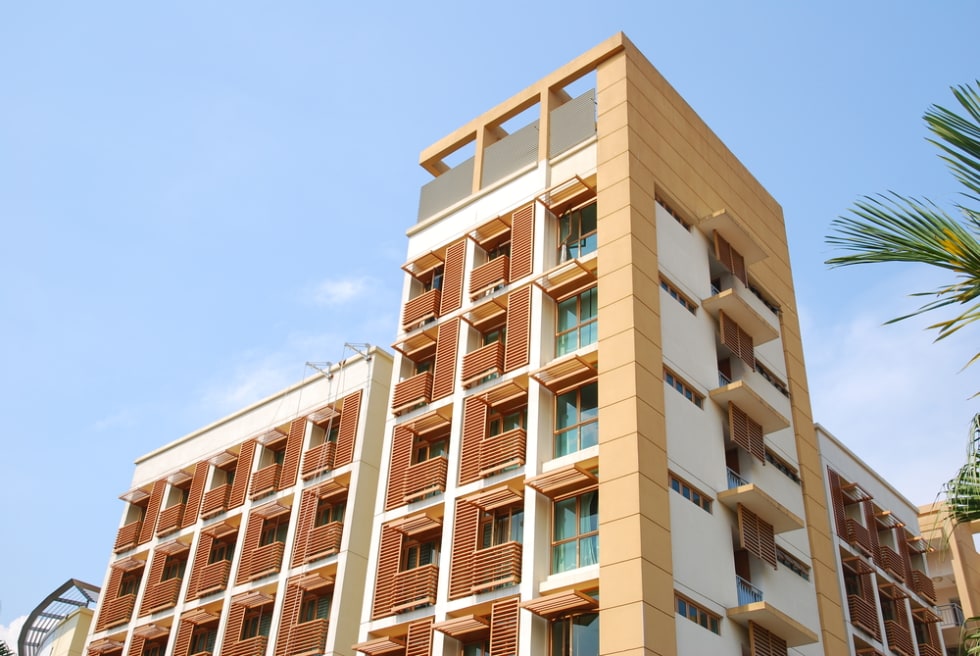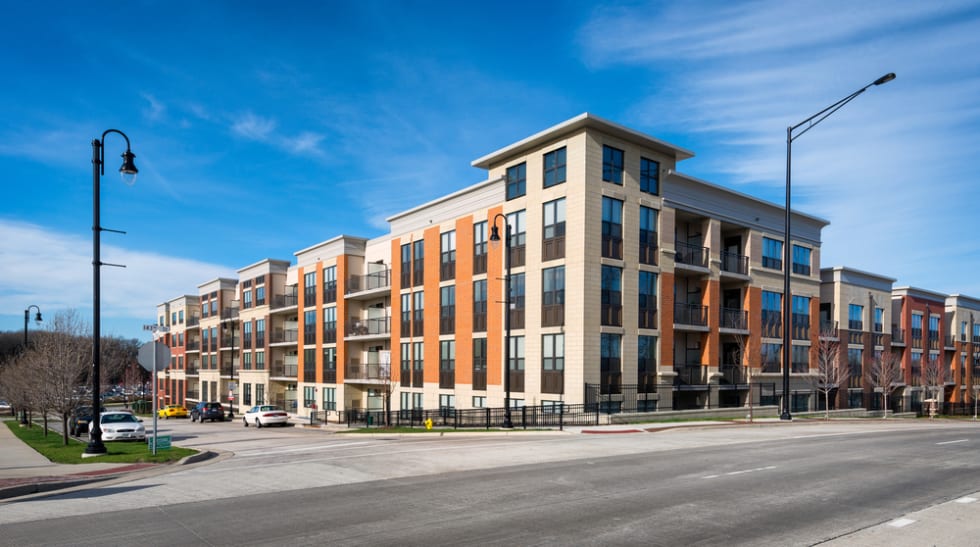Dorms vs. Off-Campus Apartments - Which is Right for Me?

College years are full of decisions, including which school you want to attend, which courses you’ll take, and so on.
Among these decisions will be whether you’ll live in a dorm or an off-site apartment.
Though it’s not a life-altering decision, it is important that you choose a living situation that sets you up for success.
So, which is right for you? A dorm or an off-campus apartment?
In this guide, we’ll explore the differences between a dorm and an off-campus apartment and provide the best tips on how to find an off-campus apartment near you.
Let’s dive in.

How to Find Off-Campus Apartments
Finding an off-campus apartment isn’t particularly challenging. It’s finding an apartment that meets your needs that will present the biggest challenge.
Here are some tips to help you find the right off-campus apartment for you.
Start your Search Early
The right time to look for an apartment depends on your needs.
If you are looking for rent that’s more affordable and you have the time, start looking for apartments in late December. This is when apartment searches are at their lowest, so you’ll find cheaper rent rates and move-in incentives.
However, if you want to choose from a larger selection of units, regardless of price, start your search in March, as this is the month that the moving seasons start. As more units become available, your options will increase.
Above all, the best timing advice when it comes to renting an apartment is to start your search as early as possible.
Giving yourself time to find the right apartment can help you avoid becoming overwhelmed.
Know What You Are Looking For
Unlike dorms, off-campus apartments have a lot of variety. You may find that there are so many options that the hunt for the perfect apartment becomes overwhelming.
Luckily, that outcome is easily rectified with a must-have list. A must-have list is a set of essential apartment amenities, such as layout, square footage, and other features that you want your apartment to have.
Just keep in mind that you may have to pay more for units with tons of amenities or those that fit into the luxury apartment category.
You’ll need to set a strict apartment budget to ensure that you find a unit that you can afford.
If you’re not sure where to start, use our rent calculator tool to determine how much you can afford to pay in rent each month. Once you’ve got your number, try out a budgeting app to keep you on track.
Search for Listings Online
If you want to simplify your apartment search, start by using an online rental platform, like Apartment List.
When you use Apartment List to find an apartment near campus, you’ll be able to choose from a large selection of units while our rental concierge helps match you with units that best suit your needs.
So, whether you want a unit with on-site laundry, are looking for affordable apartments near campus, or want to rent an apartment that will allow you to house a four-legged friend, Apartment List can help you find the perfect match.
In some cases, your school may have social media groups dedicated to helping students find sublets or fill up spaces in a multi-bedroom unit. If you’re looking for sublets or don’t care too much about who you live with, this may be a good place to start your search.
Set Up Apartment Tours
One of the most important aspects of your apartment tour is learning all the important details about renting the unit.
You should prepare a list of questions to ask your prospective landlord.
These questions should help you paint a picture of life in the unit, from parking to rent payments to maintenance requisitions and everything in between.
It’s important to know what you’ll be getting into before signing a lease agreement.
Beyond feeling like an interview, apartment tours are actually quite fun. It’s easy to get caught up in daydreams imagining yourself in the space or how you’ll decorate your bedroom.
However, an apartment tour is not the time to be playing Joanna Gaines. Instead, you should be playing Sherlock Holmes.
During your apartment tour, you’ll need to inspect the unit for any problems that may become headaches later on.
Outlets that don’t work, windows that won’t open, and uncleaned appliances all fit the bill. Note these issues, and bring them up before signing a lease agreement.
Apply and Sign Your Lease
Putting in an apartment application is a great feeling. You’ve found an apartment that you love, and are moving forward in the rental application process.
That said, it can also be a nerve-wracking experience, especially for a first-time renter. Luckily, submitting an apartment rental application is simple. Just be sure to:
- Set some money aside for potential application fees.
- Check and double-check that you’ve completely filled out your application with the right information.
- Let any references know that you’ve used them on the application and they should expect a call or email about it.
- Make sure there aren’t any surprises on your credit report and that you have the right credit score to rent an apartment.
Once you’ve submitted your application and are approved as the unit’s next tenant, you’ll be asked to sign a lease agreement.
Read your lease agreement.
It’s boring and long-winded, but it’s also crucial that you know what is expected of you as a tenant and what you can expect from your landlord or property manager.
If there are terms you don’t agree with, you may be able to negotiate with them before signing. If not, you’ll be able to walk away from the deal.
Once you’ve determined that your lease agreement is solid, you’re square and ready to move into your dream unit.

Pros and Cons of Dorms
Dorm living isn’t for everyone.
If you’re not sure whether living in an on-campus dorm is the right option for you, you’ll have to take some time to research dorm life, including its pros and cons.
Luckily, we’ve made it easy for you. Below are the pros and cons of on-campus dorms.
Pros of Dorms
- On-Campus Amenities: Generally, the room and board payment that covers on-campus housing include tons of amenities, such as free gym memberships, unlimited access to all campus facilities, direct access to campus bus routes, and more.
- Location: When it comes to location, you can’t get much better than a dorm on-campus. Your friends are nearby, as are your classes, the gym, the library, and of course, dining halls.
- Easier to Furnish: In an on-campus dorm, your bed, dresser, and desk are generally provided for you. You don’t have to buy much to furnish the dorm room or communal spaces. Though you may want to invest in storage options.
- Less Maintenance: Bathrooms are typically cleaned by maintenance staff on a regular schedule, as are the other communal areas within the dorm building. If you have a maintenance issue, they are usually quickly resolved by the on-site maintenance staff, as well.
Cons of Dorms
- Dorm Restrictions/Less Freedom: College dorm rules can be pretty restrictive. Rules regarding alcohol, visitors, and even having a microwave are pretty strict. If you break even one, the RA down the hall is sure to notice.
- Shared Bathrooms: There’s a reason that bathrooms are cleaned so regularly. Communal bathrooms in college dorms can get pretty gross pretty quickly. You may also find yourself waiting to use the facilities if they are already in use, which could make you late to class.
- Roommates in Cramped Spaces: Living with roommates isn’t necessarily a bad thing, provided everyone gets their own space. Unfortunately, that’s hard in a dorm, when you’re expected to share all living spaces, including your tiny bedroom.

Pros and Cons of Off-Campus Apartments
As many colleges require students to live on-campus for their first couple of years, you’ll have some time to decide whether you want to continue living on campus for your student career’s duration.
However, without any experience renting an off-campus apartment, making a final decision can be challenging, which is why it’s essential to consider the pros and cons of renting an off-campus apartment.
Once you know exactly what you stand to gain or lose by renting an off-campus apartment, you can make an informed decision that works best for you.
To help, we’ve outlined the pros and cons of renting an off-campus apartment.
Pros of Off-Campus Apartments
- Cost: In many cases, you’ll be paying for the cost of room and board in a college dorm, the board being all the privileges listed above. So, it can be quite expensive to live in an on-campus dorm.
- Spaciousness: When you go from living in a cramped dorm room with a roommate to renting an off-campus apartment, the size difference can be staggering.
- More Freedom and Privacy: Though you may have roommates, they won’t be sharing a room with you, nor will you have to share bathrooms with a ton of other dorm residents or deal with college kid antics. So, if you want to celebrate your newfound freedom by going all Risky Business, go off!
- Less Expensive: As renting dorm apartments typically include paying for room and board, whereas an off-campus apartment only requires rent payment, you’ll likely be saving a few grand on rent by renting an off-campus unit.
- More Independence: In an off-campus apartment, there are no RAs right down the hall. You can make your own meals whenever you want and follow your own schedule. It’s as near as you can get to true adulting, even as a college student.
Cons of Off-Campus Apartments
- More Renter Responsibilities: As a renter, you may be responsible for setting up utilities such as internet and cable. You’ll also need to handle cleaning, maintenance requests, grocery shopping, and more.
- Cost: You’ll have more costs associated with an off-campus apartment unit than you would an on-campus dorm. You’ll have to furnish the entire unit, as opposed to just a single room. You may also have to pay one lump sum rent payment each semester, rather than smaller monthly payments.
- Location: Off-campus apartments that are close to campus usually cost much more than units farther away. For student renters trying to avoid college debt, choosing a farther apartment makes sense. That said, the location may mean you’ll need to own a car to get to and from class, and that you’ll be more isolated from other college students.
- Loss of Privileges: Though you may still have access to most on-campus amenities, you may be asked to pay a reduced rate to access some on-campus amenities, such as the gym or pool, that were previously free to use.
Final Thoughts - Which is Right for Me?
When it comes to choosing the right living situation during your college years, you may have a hard time deciding between dorms and off-campus apartments.
That said, it all comes down to your preferences. Take some time to research before coming to a final decision.
If you opt for an off-campus apartment, Apartment List can help you find your dream unit.
Take our quiz above to help you find an off-campus apartment that’s everything you’ve ever hoped for!
Share this Article



